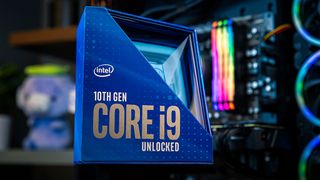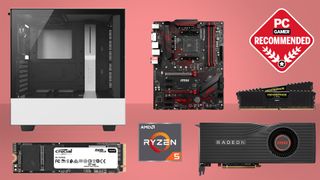Even if Intel launches a Core i9 10900KS tomorrow, you should wait for Rocket Lake
A special edition Core i9 10900KS feels like an unnecessary addition with Rocket Lake right around the corner.

Intel is expected to launch its next-generation Rocket Lake processors in a few weeks (at least by the end of March), marking its biggest desktop architectural upgrade in years, though it may have one last hurrah up its sleeve for Comet Lake—a special edition Core i9 10900KS. However, it is because Rocket Lake is right around the corner that a new addition to its 10th Gen lineup doesn't make a whole lot of sense.
Whether or not Intel goes through with launching a 10900KS chip remains to be seen. At the very least, Intel had at one time planned to release the unannounced SKU. We know this because Intel references the 10900KS in a Software Advantage Program document (via WCCFTech), pertaining to its Crysis Remastered game bundle promotion. It sits among a whole bunch of existing CPUs as one of many qualifying chips for the free game offer.
That particular bundle, which also offered Street Fighter V and Serious Sam 4, was around late last year, and though it is on until March 31 this year, that makes us think Intel chose not to go ahead and release the chip with its next CPU generation following so close.
The last "KS" chip Intel released was the last-gen Core i9 9900KS. You can think of it as a binned version of the Core i9 9900K. Both are 8-core/16-thread processors, each with 16MB of L3 cache and a 5GHz max turbo frequency. However, the 9900KS upped the ante with a faster base clock (4GHz versus 3.6GHz) and faster all-core turbo clock (5GHz versus 4.8GHz), made possible by a higher TDP (127W versus 95W).
It stands to reason a 10900KS would follow the same general blueprint, in that it would be the finest silicon capable of hitting higher clocks. Here's the thing, though—the 10-core/20-thread 10900K is already a speedy chip, with a 3.7GHz base clock and 5.1GHz single-core turbo clock. And if you plop it under a chilly cooling solution, it can go even higher with Intel's Thermal Velocity Boost technology—up to a 5.3GHz single-core turbo clock and 4.9GHz on all 10 cores.
There's not a lot of wiggle room to inject more power into the equation either, as the 10900K already has a 125W TDP. Probably the best case scenario is Intel doesn't need to increase the TPD any further, and through selective binning, is able to offer up a batch of 10900KS CPUs capable of maintaining a 4GHz base clock and slightly faster turbo clocks.

Best CPU for gaming: the top chips from Intel and AMD
Best graphics card: your perfect pixel-pusher awaits
Best SSD for gaming: get into the game ahead of the rest
It's not out of the realm of possibility. In fact, retailer Silicon Lottery makes a living by selling CPUs it bins itself, charging extra for ones that are guaranteed to run at higher-than-stock settings (albeit at specific settings within the BIOS). That includes the 10900K—one of the binned offerings is guaranteed to run stable at 5.1GHz across all 10 cores. And according to the retailer, the top 21 percent 10900K chips it tested were able to hit 5.1GHz or higher.
The biggest gaming news, reviews and hardware deals
Keep up to date with the most important stories and the best deals, as picked by the PC Gamer team.
The caveat is still Rocket Lake. It feels extremely late in the game to launch a special edition Comet Lake chip, and even if the 10900KS debuted tomorrow or later today, it makes more sense to wait. Intel is claiming a double-digit IPC gain with Rocket Lake—which is surely going to make more of a difference in gaming—on top of adding support for technologies like PCI Express 4.0. It might even be cheaper at the top end too, since Rocket Lake will top out in an 8-core/16-thread configuration.
Paul has been playing PC games and raking his knuckles on computer hardware since the Commodore 64. He does not have any tattoos, but thinks it would be cool to get one that reads LOAD"*",8,1. In his off time, he rides motorcycles and wrestles alligators (only one of those is true).
Most Popular






